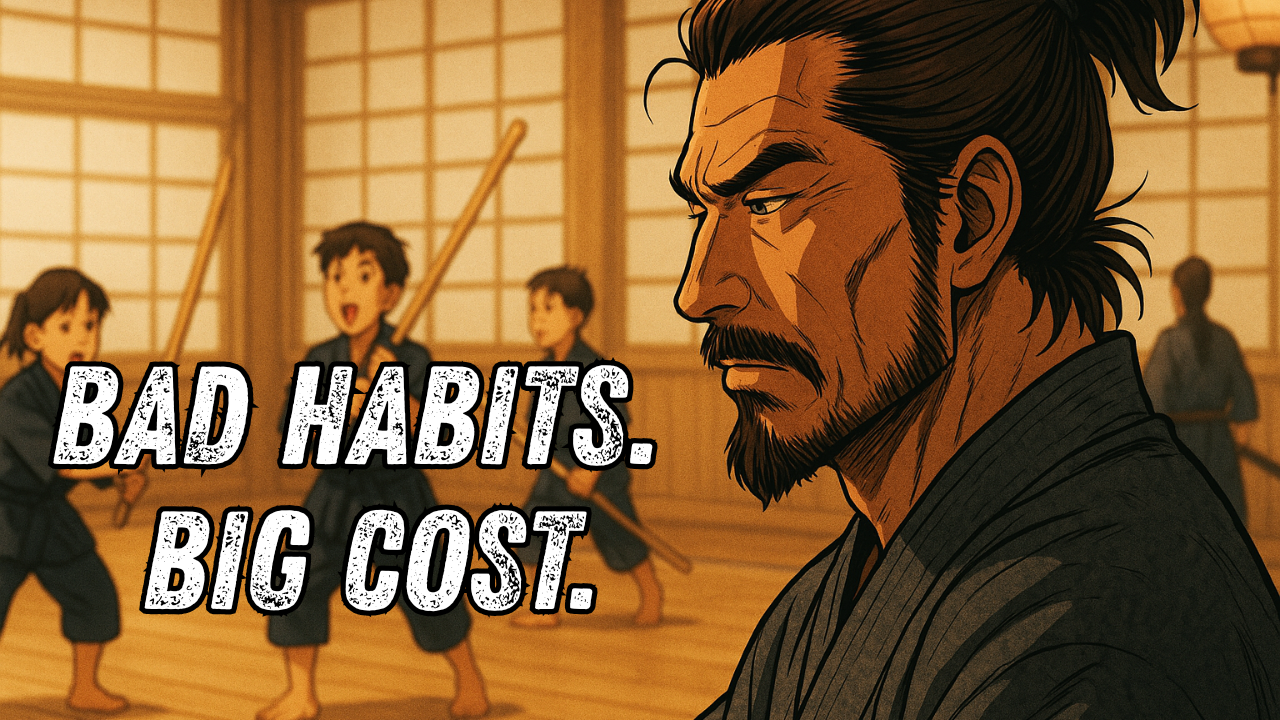The Quiet Ways We Sabotage Our Clubs

The Standard You Walk Past Is The Standard You Accept
Dojo culture isn’t built on speeches, it’s built on habits. The habits we allow don’t just shape performance, they shape the entire culture our students inherit.
Here are four coaching habits that quietly shape the dojo, for better or worse.
1. Habits of Attention
Let me paint you a familiar picture. Brian, our enthusiastic-but-perpetually-scrambling club sempai, charges into the dojo five minutes late, chucks his shoes sideways, and mumbles something about traffic. Again.
He’s flustered because students are already lined up, and the warm-up becomes a chaotic game of copy-the-front-row.
Posture? Half of them look like they’re bracing for a typhoon.
Breathing? More like survival panting.
And yet, strangely, no one seems surprised.
Why? Because that’s the habit. And once it’s repeated often enough, it becomes culture. When lateness is normal, discipline becomes optional. When warm-ups are sloppy, effort becomes optional.
This isn’t just about Brian. It’s about what we tolerate. Those tiny acts of attention, or inattention, are the cues everyone else takes. Before long, they aren’t just moments. They’re culture.
2. Habits of Feedback
We all carry habits. Some sharpen us, others dull the blade.
For years, I thought more feedback was always better. Every men-uchi got a comment: “Lift your left hand. Step sooner. Don’t breathe like that.”
Turns out, I wasn’t helping. I was training students to wait for my thoughts instead of reflecting on their own.
Then I changed my habit. I started asking, “What did you notice about x, y, or z?” before I jumped in with my own observations.
The result? They started noticing their own timing. They started noticing the impact of their own choices. They began talking about seme and openings with clarity I hadn’t seen before. It was a tiny change with a massive ripple effect over time.
And that ripple didn’t just improve technique. It changed the dojo atmosphere. Reflection became normal. Students spoke to each other differently. Learning felt shared, not spoon-fed.
That’s culture too, built from one coaching habit.
3. Habits of Tradition
Of course, there’s a shadow in every dojo: tradition. The old-school, voice-like-thunder, sensei-knows-best model. I trained under it. Hell, it still comes out in me sometimes. (Some habits die harder than others). And yes, it works, to a point.
But let’s not pretend it’s the only way.
Modern research tells us athletes don’t learn best by copying perfection or following orders. They learn by adapting to pressure, perceiving opportunity, and making decisions in context.
If our coaching habits strip away that adaptive tension, if we’re scripting every move, we’re not building autonomy. We’re building dependency. And dependency doesn’t just stall learning, it bleeds into the whole club culture. People get used to waiting for sensei to call the shots, instead of learning to spot problems and tackle them themselves.
The way I see it, the more we spoon-feed on the floor, the less initiative people take off it. In the long run, that can leave club leaders carrying everything: organisation, events, even the smallest decisions.
Tradition has its strengths. But when it hardens into a habit we never question, it breeds a culture of obedience, not curiosity or autonomy.
4. Habits of Language and Role-Modelling
Habits aren’t just what coaches do. They’re what sempai do. What seniors say. The background noise that juniors soak up until it becomes normal.
If older members wander in late, or chatter through keiko, people will copy. Peer habits are culture.
The same goes for language. A constant stream of “don’t do this, don’t do that” breeds a fear culture where students second-guess everything. But one small shift, like questions, encouragement, or noticing effort, builds a culture of reflection and growth.
We sometimes think culture is about the big speeches. It’s not. It’s in the throwaway comments, the tone we use, the way seniors carry themselves. Those micro-habits teach as much as any fancy drill.
The Dojo Evolves (With or Without You)
A dojo isn’t static. It shifts with us, or without us.
And if your sessions feel like déjà vu with more sweat, if the same reactions keep surfacing, if your culture feels stuck, maybe it’s not about effort. Maybe it’s the habits you’ve stopped noticing.
So after keiko, don’t just ask how they did. Ask how you connected. Whether your structure served learning, or just filled time. Whether your habits reflected your values, or just repeated your past.
Because the standard you walk past is the standard you accept. And in the dojo, the habits you tolerate aren’t just routines, they’re culture.
P.S.
If the idea of habits, reflection, and not pretending to have it all figured out resonates, I had a great chat with Dr. Joe Hall on exactly that: coaching, growth mindset, and why it’s okay (maybe even necessary) to feel like we’re still figuring it out. You can watch that conversation here. Its worth a click. 😉